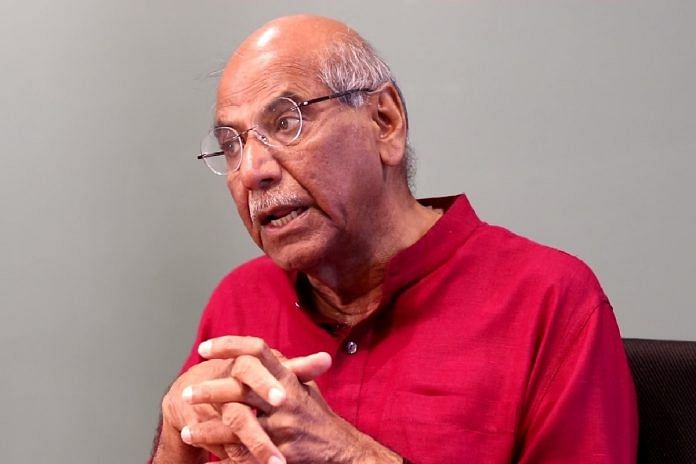Saran says, PM has more confidence in personal diplomacy over more traditional methods, but is facing a challenge when it comes to Trump.
New Delhi: Prime Minister Narendra Modi is “not quite sure” how he should deal with US President Donald Trump, former foreign secretary Shyam Saran has said.
Speaking at a book launch Tuesday, Saran emphasised that the PM had more confidence in personal, leader-to-leader diplomacy over the traditional ones, but was facing a challenge when it came to Trump.
Referring to Trump’s remarks and mimicry of Modi as he spoke against import duties levied on Harley-Davidson motorcycles by India, Saran said Modi should consider himself “lucky” considering how Trump has treated Canadian Prime Minister Justin Trudeau.
Saran was part of a panel discussion after the release of The Most Dangerous Place: A History of the United States in South Asia written by Srinath Raghavan. Besides Saran and Raghvan, journalist Suhasini Haidar also took part in the discussion moderated by senior lecturer at King’s College Rudra Chaudhuri.
According to Haidar, “small” problems such as the postponement of the two-plus-two dialogue between India and the US have begun to garner attention unlike before.
“It is clearly a signal that other things are not working in the bilateral relationship,” she said.
Raghvan also highlighted that Trump is putting the US first and walking away from earlier arrangements which existed despite being “asymmetric”.
“Trump’s larger agenda is to unravel this old order of globalisation which the US itself brought into being particularly after the cold war, the embracing of which was of benefit to India and China and others,” he added.
India’s complicated relationship with the US
The book analyses the US’ relationship with India, Pakistan and Afghanistan and tries to study why American policies towards these countries have failed despite US’ relative foreign policy success in East Asia and Western Europe.
“When the US looks at India, India may be a dog that may bark very loudly but rarely bites and here is also an India which smiles but rarely yields…somehow we are not able to sit down and bargain like other countries,” said Saran.
According to Raghavan, American perception of India has traditionally been shaped by race and religion and these attitudes have continued to persist since. Americans have a strong sense of hierarchy when dealing with the Indian subcontinent, he added.
Saran said that in his personal experience, interactions with Americans had cultural and historical undertones, some of which could have even led to the breakdown of the India-US nuclear scheme.
“I can recall at least three or four interventions by Bush and Dr Manmohan Singh without which the deal could not have moved on,” he added.




Everyone is struggling to deal constructively with this administration, which itself is not standing on the same spot for long. In that sense at least we should not be heartbroken. We can allow Harley Davidson bikes – soon to be made outside the US – free of duty, but should draw red lines around valuable, time tested relationships like Russia and Iran.